
German literature comprises those literary texts written in the German language. This includes literature written in Germany, Austria, the German parts of Switzerland and Belgium, Liechtenstein, Luxembourg, South Tyrol in Italy and to a lesser extent works of the German diaspora. German literature of the modern period is mostly in Standard German, but there are some currents of literature influenced to a greater or lesser degree by dialects.

The Piano Teacher is a 2001 erotic psychological drama film written and directed by Michael Haneke, based on the 1983 novel of the same name by Elfriede Jelinek. It tells the story of an unmarried piano teacher at a Vienna conservatory, living with her mother in a state of emotional and sexual disequilibrium, who enters into a sadomasochistic relationship with her student. A co-production of Austria and France, Haneke was given the opportunity to direct after previous attempts to adapt the novel by filmmakers Valie Export and Paulus Manker collapsed for financial reasons.

Elfriede Jelinek is an Austrian playwright and novelist. She is one of the most decorated authors to write in German and was awarded the 2004 Nobel Prize in Literature for her "musical flow of voices and counter-voices in novels and plays that, with extraordinary linguistic zeal, reveal the absurdity of society's clichés and their subjugating power". Along with Peter Handke and Botho Strauss, she is considered to be among the most important living playwrights of the German language.

Olga Neuwirth is an Austrian contemporary classical composer, visual artist and author. She gained fame mainly through her operas and music theater works, which often deal with topical and decidedly political themes of identity, violence and intolerance.
Austrian literature is mostly written in German, and is closely connected with German literature.
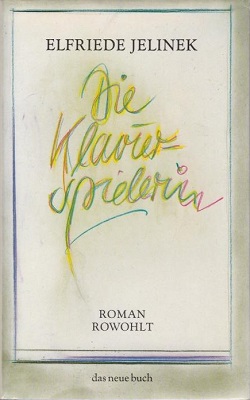
The Piano Teacher is a novel by Austrian Nobel Prize winner Elfriede Jelinek, first published in 1983 by Rowohlt Verlag. Translated by Joachim Neugroschel, it was the first of Jelinek's novels to be translated into English.

Michael Hulse is an English poet, translator and critic, notable especially for his translations of German novels by W. G. Sebald, Herta Müller, and Elfriede Jelinek.
Illness or Modern Women is a play by the Austrian playwright Elfriede Jelinek. It was published in 1984 in the avant-garde journal manuscripte of Graz and premiered on the stage of the Schauspielhaus Bonn on February 12, 1987, directed by Hans Hollmann. The play was published in book form by Prometh Verlag in 1987 with an afterword by Regine Friedrich. The title "parodically conflates women with illness." The play is based on an earlier, shorter radio play by Jelinek called Erziehung eines Vampirs, which appeared in 1986 on Süddeutscher Rundfunk.
Marlen Haushofer was an Austrian author, most famous for her novel The Wall (1963).
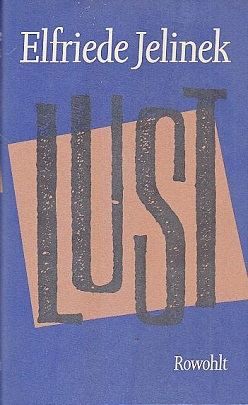
Lust is a novel by Austrian author Elfriede Jelinek. Originally published in German in 1989, it was translated into English in 1992 by Michael Hulse.

Princess Maria Anna of Bavaria, known as 'Marie' was Queen of Saxony from 1836 to 1854 as the second wife of King Frederick Augustus II of Saxony.
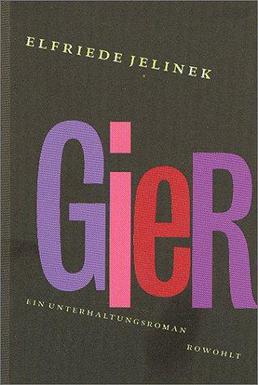
Greed is a 2000 novel by the Austrian writer Elfriede Jelinek. It was the first novel of hers to be translated into English after winning the Nobel Prize for Literature, and also the first book of hers to be translated into English in seven years. The English translation was published in the UK by Serpent's Tail in 2006 and in the US by Seven Stories Press in 2007. While much of her work is rooted in the Austrian literary tradition, she has also been known to take a feminist stand on the dealings of the Communist Party of Austria.
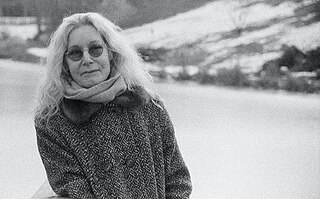
Irene Dische is an American-Austrian author, journalist, screenwriter, and librettist whose work explores the German-Jewish experience, alienation, and exile.

Elfriede Gerstl was an Austrian author and Holocaust-survivor. Gerstl, who was Jewish, was born in Vienna, where her father worked as a dentist.
Was geschah, nachdem Nora ihren Mann verlassen hatte; oder Stützen der Gesellschaften is a play by Austrian playwright Elfriede Jelinek. It was first published in 1979 and premiered in October that year, directed by Kurt-Josef Schildknecht, in Graz.
The Wall is a 1963 novel by Austrian writer Marlen Haushofer. Considered the author's finest work, The Wall is an example of dystopian fiction. The English translation by Shaun Whiteside was published by Cleis Press in 1990.

The Children of the Dead is a novel by Elfriede Jelinek, first published in 1995 by Rowohlt Verlag. It is commonly regarded as her magnum opus. The novel won the Literaturpreis der Stadt Bremen in 1996. The prologue and epilogue were translated into English by Louise E. Stoehr in 1998, while a full English translation by Gitta Honegger will be published by Yale University Press in 2024.
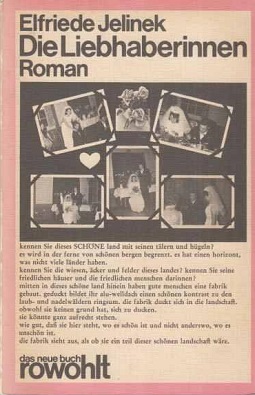
Women as Lovers is a novel by Austrian Nobel laureate Elfriede Jelinek that details the lives of the characters Brigitte and Paula, as the two women transition from dreams of the future, to life with a husband and children. In the novel, Brigitte succeeds in "snagging the social and economic commodity Heinz, which directly results in an upgrading of her socioeconomic status." But she pays for it with her body and the loss of her private autonomy. Paula's existence, on the other hand, is "destroyed by her belief in the illusion of love."
Damion Searls is an American writer and translator. He grew up in New York and studied at Harvard University and the University of California, Berkeley. He specializes in translating literary works from Western European languages such as German, Norwegian, French, and Dutch. Among the authors he has translated are Marcel Proust, Thomas Mann, Rainer Maria Rilke, Robert Walser, Ingeborg Bachmann, Thomas Bernhard, Kurt Schwitters, Peter Handke, Jon Fosse, Heike B. Görtemaker, and Nescio. He has received numerous grants and fellowships for his translations.

The 2004 Nobel Prize in Literature was awarded to the Austrian writer Elfriede Jelinek "for her musical flow of voices and counter-voices in novels and plays that with extraordinary linguistic zeal reveal the absurdity of society's clichés and their subjugating power". She is the tenth female and the first Austrian Nobel laureate followed by Peter Handke in 2019.













